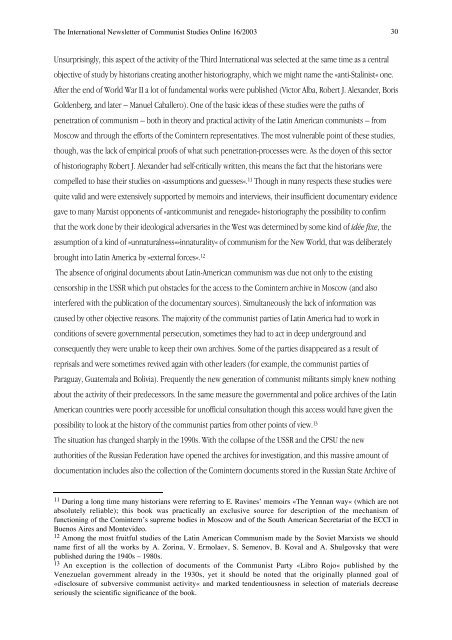The International Newsletter of Communist Studies Online IX
The International Newsletter of Communist Studies Online IX
The International Newsletter of Communist Studies Online IX
Create successful ePaper yourself
Turn your PDF publications into a flip-book with our unique Google optimized e-Paper software.
<strong>The</strong> <strong>International</strong> <strong>Newsletter</strong> <strong>of</strong> <strong>Communist</strong> <strong>Studies</strong> <strong>Online</strong> 16/2003 30<br />
Unsurprisingly, this aspect <strong>of</strong> the activity <strong>of</strong> the Third <strong>International</strong> was selected at the same time as a central<br />
objective <strong>of</strong> study by historians creating another historiography, which we might name the »anti-Stalinist« one.<br />
After the end <strong>of</strong> World War II a lot <strong>of</strong> fundamental works were published (Victor Alba, Robert J. Alexander, Boris<br />
Goldenberg, and later – Manuel Caballero). One <strong>of</strong> the basic ideas <strong>of</strong> these studies were the paths <strong>of</strong><br />
penetration <strong>of</strong> communism – both in theory and practical activity <strong>of</strong> the Latin American communists – from<br />
Moscow and through the efforts <strong>of</strong> the Comintern representatives. <strong>The</strong> most vulnerable point <strong>of</strong> these studies,<br />
though, was the lack <strong>of</strong> empirical pro<strong>of</strong>s <strong>of</strong> what such penetration-processes were. As the doyen <strong>of</strong> this sector<br />
<strong>of</strong> historiography Robert J. Alexander had self-critically written, this means the fact that the historians were<br />
compelled to base their studies on »assumptions and guesses«. 11 Though in many respects these studies were<br />
quite valid and were extensively supported by memoirs and interviews, their insufficient documentary evidence<br />
gave to many Marxist opponents <strong>of</strong> »anticommunist and renegade« historiography the possibility to confirm<br />
that the work done by their ideological adversaries in the West was determined by some kind <strong>of</strong> idée fixe, the<br />
assumption <strong>of</strong> a kind <strong>of</strong> »unnaturalness«»innaturality« <strong>of</strong> communism for the New World, that was deliberately<br />
brought into Latin America by »external forces«. 12<br />
<strong>The</strong> absence <strong>of</strong> original documents about Latin-American communism was due not only to the existing<br />
censorship in the USSR which put obstacles for the access to the Comintern archive in Moscow (and also<br />
interfered with the publication <strong>of</strong> the documentary sources). Simultaneously the lack <strong>of</strong> information was<br />
caused by other objective reasons. <strong>The</strong> majority <strong>of</strong> the communist parties <strong>of</strong> Latin America had to work in<br />
conditions <strong>of</strong> severe governmental persecution, sometimes they had to act in deep underground and<br />
consequently they were unable to keep their own archives. Some <strong>of</strong> the parties disappeared as a result <strong>of</strong><br />
reprisals and were sometimes revived again with other leaders (for example, the communist parties <strong>of</strong><br />
Paraguay, Guatemala and Bolivia). Frequently the new generation <strong>of</strong> communist militants simply knew nothing<br />
about the activity <strong>of</strong> their predecessors. In the same measure the governmental and police archives <strong>of</strong> the Latin<br />
American countries were poorly accessible for un<strong>of</strong>ficial consultation though this access would have given the<br />
possibility to look at the history <strong>of</strong> the communist parties from other points <strong>of</strong> view. 13<br />
<strong>The</strong> situation has changed sharply in the 1990s. With the collapse <strong>of</strong> the USSR and the CPSU the new<br />
authorities <strong>of</strong> the Russian Federation have opened the archives for investigation, and this massive amount <strong>of</strong><br />
documentation includes also the collection <strong>of</strong> the Comintern documents stored in the Russian State Archive <strong>of</strong><br />
11 During a long time many historians were referring to E. Ravines’ memoirs «<strong>The</strong> Yennan way« (which are not<br />
absolutely reliable); this book was practically an exclusive source for description <strong>of</strong> the mechanism <strong>of</strong><br />
functioning <strong>of</strong> the Comintern’s supreme bodies in Moscow and <strong>of</strong> the South American Secretariat <strong>of</strong> the ECCI in<br />
Buenos Aires and Montevideo.<br />
12 Among the most fruitful studies <strong>of</strong> the Latin American Communism made by the Soviet Marxists we should<br />
name first <strong>of</strong> all the works by A. Zorina, V. Ermolaev, S. Semenov, B. Koval and A. Shulgovsky that were<br />
published during the 1940s – 1980s.<br />
13 An exception is the collection <strong>of</strong> documents <strong>of</strong> the <strong>Communist</strong> Party «Libro Rojo« published by the<br />
Venezuelan government already in the 1930s, yet it should be noted that the originally planned goal <strong>of</strong><br />
«disclosure <strong>of</strong> subversive communist activity« and marked tendentiousness in selection <strong>of</strong> materials decrease<br />
seriously the scientific significance <strong>of</strong> the book.














